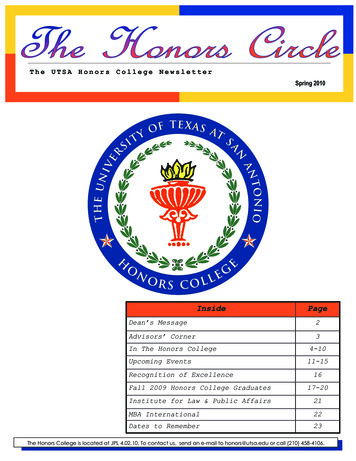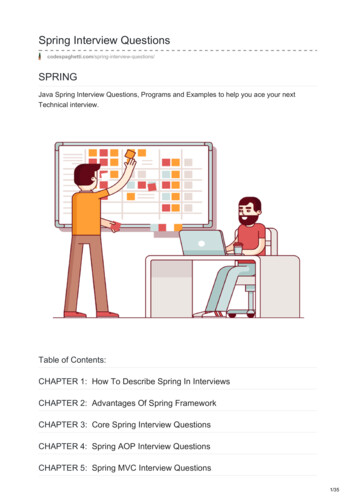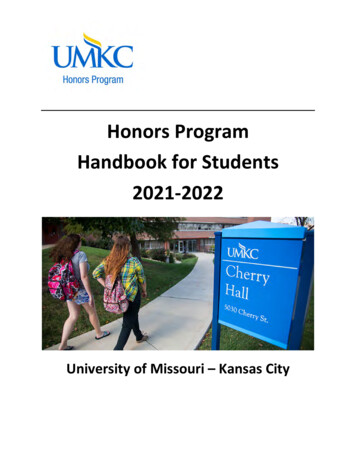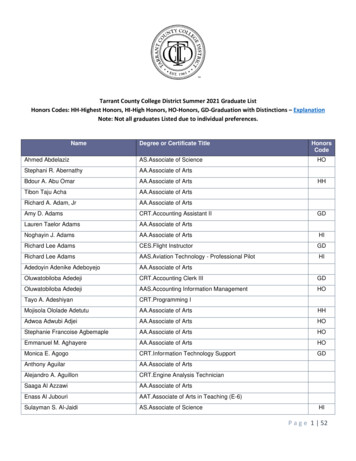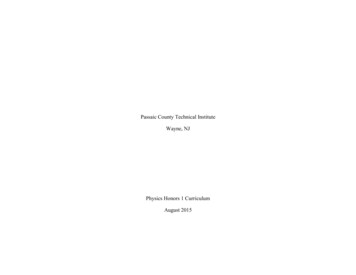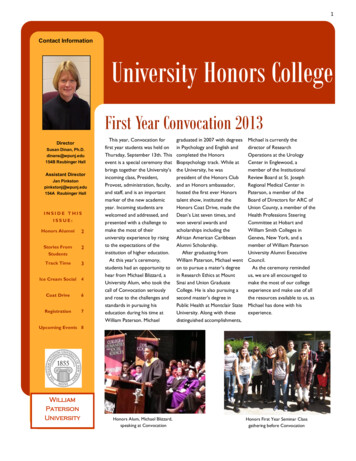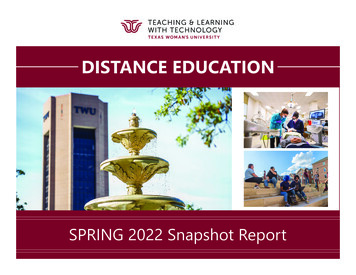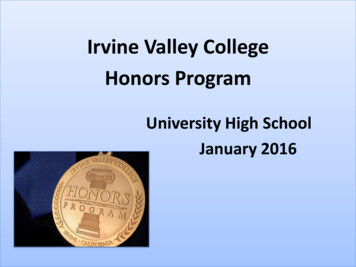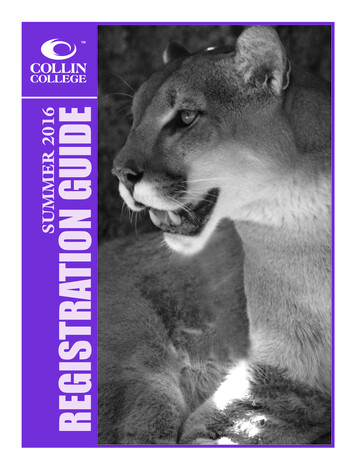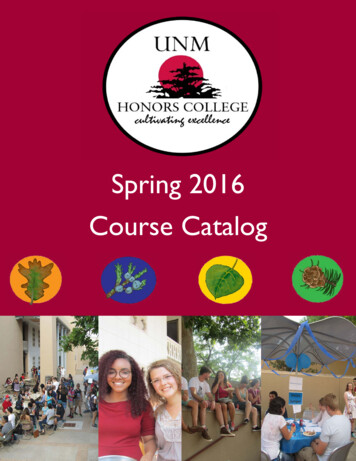
Transcription
Spring 2016Course Catalog
Table of ContentsUNM HONORS COLLEGE - SPRING 2016100 LevelCRN462444727955229476715032655237Course # Cr 333Legacy of DreamsLegacy of Social Justice: Historical & Contemp. Topics in Soc. Justice TheoryLegacy of DramaLegacy of the RenegadeLegacy of SuccessLegacy of the Civil War200 0894986252350552405360853609536104987953126Course # Cr 004205.005207.004207.00533333333333333333Rhetoric and Discourse: Become A Better WriterRhetoric and Discourse: A Mirror of My Own: Female Self Portraits in ComicsRhetoric and Discourse: Writing A Life: The Human Exp. through MemoirsMath Wrld: Statistics for Career and LifeMath Wrld: Journey through GeniusScience in the 21st Century: Physics is Everywhere: Rainbows to RefrigeratorsScience in the 21st Century: Energy: Burning the World from Both EndsScience in the 21st Century: Bringing Fossils to LifeScience in the 21st Century: PhysicsIndividual and Collective: Globalization and HRTSIndividual and Collective: Understanding Social ChangeHumanities Society & Culture: Questioning AuthorityHumanities Society & Culture: Living Eastern LegaciesHumanities Society & Culture: When Poe Talks to Freud: Theories of HorrorHumanities Society & Culture: Orality of PoetryFine Arts as Global Perspective: Social Trans. Through ArtFine Arts as Global Perspective: Designing Where we Live300 0Course # Cr 7399.01833333333333333333333333333333Making of a MagazineWorld-building: Designing the Multiverse of Speculative FictionWhat Good is Tolerance?AmazoniaAnthropology of RitualReading & Writing the Landscape of the Lewis and Clark Trail - Part 1Clothing and SocietyContemporary Ethical Issues in FashionScientific and Social Aspects of DiseaseWar Cry20th Century American Drama20th Century American DramaPutin's RussiaFood and Society -- Why we eat what we do, and why it mattersIdentity and PlaceA Toy Story - The Process of DesignVisions of the Afterlife - A Cross-Cultural Journey through the Four Last ThingsGlobal Aesthetics and Art ProductionPicture a Story--The Art of Graphic NovelsWhy People Believe Weird ThingsPhenomena of ColorPhenomena of Color Production StudioReading & Writing the Landscape of the Lewis and Clark Trail - Part 2Getting Away with Murder: The Cultural Construction of Serial KillersGames for ChangeFilming the HolocaustHarry Potter: Philosopher and TheologianPeace from Conflict to ReconciliationSocio-cultural Studies of Health, Illness, and the Biomedical SciencesInstr. LastInstr. FirstCategory wnMariaNoraRichardRyanCore: HumCore: HumCore: HumCore: HumCore: HumCore: Hum222822161216Instr. LastInstr. FirstCategory FeeRm eganAtsukoCore: HumCore: W&SCore: W&SCore: MathCore: MathCore: PNSCore: PNSCore: PNSCore: PNSCore: SSCore: SSCore: HumCore: HumCore: HumCore: HumCore: FACore: FA28812812888ARR8162812222299Instr. LastInstr. eeChrisSheriSheriEleniBruceGroup: HumGroup: W&SGroup: HumGroup: SSGroup: SSGroup: PNS 1,150Group: HumGroup: HumGroup: SSGroup: HumGroup: HumGroup: HumGroup: HumGroup: SSGroup: HumGroup: FAGroup: FAGroup: FAGroup: FAGroup: SSGroup: FAGroup: FAGroup: W&SGroup: HumGroup: MathGroup: HumGroup: HumGroup: HumGroup: 28Instr. LastInstr. FirstCategory FeeRm slieLizMelissaRyanGroup: FAGroup: HumGroup: HumGroup: SSGroup: SSGroup: HumGroup: HumGroup: HumGroup: HumChavez-CharlesMargoGroup: Hum400 236Course # Cr .008402.009402.010333333333Bio Art & DesignThe Creative Impulse in New MexicoMystics and LibertinesEthics: Making the Right DecisionPost War Studies: IraqWhat Worlds May ComeGender and LawHow Do Societies Remember?Researching Sports 5 10 10 35Category Fee 40Rm : 51:00-2:405:00-6:30TMTRWWTRTRTRMSummer 300 LevelTBATimeWMWMWTRTRTRTRTRRm 0930-10451800-20:30
UNM HONORS COLLEGE - SPRING 2016100 Level
UNM HONORS COLLEGE - SPRING 2016100: "Legacy of Dreams"David Higdon (dleonhigdon@q.com)Core: HumanitiesCOURSE DESCRIPTIONScientists estimate that the average person experiences approximately 136,000 dreams in a lifetime but remembers onlysome four percent of these dreams. What gives one the capacity to dream? What purpose do these dreams possess? Whyhave the world's cultures, from the time writing was invented, recorded and interpreted these dreams to determine whywe dream and how to use these dreams? The course will explore both literary and actual dreams from seventeen culturesranging from ancient, classical, medieval, and modern dreams and trace the gradual shift from gods sending propheticdreams to the Freudian/Jungian revolution to current neurological explanations of physical causes. Constantly, we will bereminded that dreaming is a universal human experience which has affected every activity from theology to sports, frommilitary strategy to contemporary music.READINGSSumerian dreams: GilgameshHebrew dreams: Joseph, Daniel, PeterViking dreams: Thorstein Egilsson, HelgiHindu and Buddhist dreams? Queen Maya, ParasuramuGreek and Roman dreams: Agamemnon, Achilles, Penelope,VirgilDream visions: Cicero, Chaucer, Cao Zueqin, Dorothy of OzRevolution in dream study: Freud, JungCreative dreaming: Mary Shelley, Paul McCartney, and othersContemporary dreams and theory: Eugene Aserinsky, William Dement, Calvin Hall, and D. M. Thomas's "The White Hotel"Most readings will be in the course packetFILMS, ETC.Victor Fleming, "The Wizard of Oz"Christopher Nolan, "Inception"Student selections for presentationCOURSE FEENoneSTUDENT REQUIREMENTSEach student will be required to write two analytical essays on dream topics, present individually or in a group of not morethan three people one oral presentation, and keep a dream journal throughout the semester.ABOUT THE INSTRUCTORDavid Leon Higdon earned his B.A. from Oklahoma City University (1962) and his M.A. (1964) and Ph.D. (1968) from theUniversity of Kansas. His teaching and research interests have resulted in 130 published essays and several books, mostrecently "Wandering into Brave New World" (2013). These earned him appointment as the Paul Whitfield Horn Professorat Texas Tech University. Presently, he is compiling an anthology of prophetic dreams from the Sumerian Gilgamesh to theAmerican Abraham Lincoln and essays on Viking dreams. His interest in dreams was sparked by childhood exposure toJewish and Christian dream interpretations, research on medieval dream visions, exploration of divination systems, andhis own very active dream life, sleep talking, and sleep walking.
UNM HONORS COLLEGE - SPRING 2016100: "Legacy of Social Justice: Historical and Contemporary Topics in Social JusticeTheory"Dawn Stracener (dawns@unm.edu)Core: HumanitiesCOURSE DESCRIPTIONWestern culture has a long history of what constitutes justice and the role of a power hierarchy in society. Plato believedthat if ruler intellectually understood good, he would be good and work for the benefit of society. Aristotle, on the otherhand, felt that a ruler would become good only if he engaged in the practice of just and virtuous actions. Classicalrepublicanism stressed that the primary purpose of government was to promote the common good of the whole societyand that civic virtue was a necessary characteristic of citizens. Yet with the Enlightenment, came a paradigm shift from theidea of ruler to the concept of leader and embedded in these new ideas was the notion of social justice. With the advent ofthe American and French Revolutions, the ‘new leaders’, philosophers, and innovative thinkers, both men and women,began to examine what constitutes social justice in a democratic society. Students in this seminar will investigate how thelegacy of ‘other’ constructed strict class divisions that helped maintain the status quo, shaped gendered rules of conduct,and constructed racially prejudiced views to maintain westernized power structures. Our present world is a reflection ofthis legacy we will explore literature that speaks with our Western voice and the voices of marginalized populations torecognize how social justice was shaped by an understanding of the essential components of democratic civic responsibility.Students will develop an intellectual understanding of critical social justice theory past and present in order to develop theirown theory on what constitutes social justice in society.READINGSGulliver’s Travels, Jonathan SwiftThe French Revolution and Human Rights, Lynn HuntThe Communist Manifesto: A Modern Edition, Friedrich Engels and Karl MarxThe Seneca Falls DeclarationThe Universal Declaration of Human Rights 1948Letter from a Birmingham Jail, Martin Luther King JrPeoples Movements, People’s Press: The Journalism of Social Justice Movements, Bob OstertagFILMS, ETC.NoneCOURSE FEENoneSTUDENT REQUIREMENTSAll students are expected to voluntarily and regularly contribute to class discussions. Effective participation is dependenton you keeping up with all the reading assignments. Various short in-class assignments will be given often, i.e. free writes,role play, debates. These assignments are designed to generate class discussions and/or give you a place to start whenanalyzing texts or doing written assignments. In addition to participation and assigned readings students will also be giventhe following assignments for assessment: one group presentation which will include an individual 2 page paper; 2 analyticalessays on the assigned readings; attend 2 Legacy Lectures (students must turn in a 1 page summary paper for each lecture)and a final synthesis paper.
UNM HONORS COLLEGE - SPRING 2016ABOUT THE INSTRUCTORDawn Stracener has a Ph.D. in Language, Literacy and Sociocultural Studies with a focus on how issues of gender, race,and class define social environments, create identities, and construct communities. Her MA is in Modern European historywith an emphasis on how cultural and gender issues have shaped modern day Western societies. Dawn has spent 18years developing learning environments to address issues of social injustice in our communities.
UNM HONORS COLLEGE - SPRING 2016100: "Legacy of Drama"Maria Szasz (deschild@unm.ued)Core: HumanitiesCOURSE DESCRIPTION"Theatre is the art by which human beings make human action worth watching."--Paul Woodruff, The Art of Watching and Being WatchedThe Legacy of Drama is an exciting exploration of some of the greatest and most influential plays ever written. Our sixteenweek tour of world drama begins with the Ancient Greeks, and then moves into the Medieval era, followed by theRenaissance, the Restoration and the eighteenth, nineteenth, twentieth and twenty-first centuries.This class will include an interdisciplinary element, encompassing theatre history, dramatic literature, world history, and thefine arts. Instead of isolating these plays and playwrights, we will discuss them as living, breathing reflections of cultural,social and political changes within their specific countries and time periods. The class will also investigate the most profoundand far-reaching theatrical innovations during each of these time periods, including the Greek notion of "catharsis"; thedifferent types of rhyme and meter within Shakespearean verse; why bawdy Restoration comedy appealed during the1700s, and then transformed into the more gentle and lighthearted comedy of the eighteenth century; the rise ofnineteenth-century American Melodrama, which soon gave way to Realism; Chekhov's development of the tragicomicgenre, which is carried on much later by Brian Friel; the advent of Absurdist theatre in the early 1950s, and the developmentof American musical theatre.This legacy class will also consider how playwrights have questioned, probed and responded to the ever-evolving roles ofwomen and minorities. Please join us to learn about how the human condition has been portrayed on stage from theAncient Greeks to the twenty-first century. As Leah Hager Cohen says, we will explore how "theatre incites us to imaginethe world from the perspective of others." This Legacy will, in turn, relate these varying historical and theatrical perspectivesto our contemporary world.READINGSSophocles, (Oedipus Rex)Euripides, (The Bacchae)(Everyman)Shakespeare, (Twelfth Night)William Wycherley, (The Country Wife)Oliver Goldsmith, (She Stoops to Conquer)Henrik Ibsen, (A Doll's House)Anton Chekhov, (The Cherry Orchard)Samuel Beckett, (Waiting for Godot)Frank Loesser, (Guys and Dolls)Caryl Churchill, (Top Girls)Athol Fugard, ("Master Harold" and the Boys)Brian Friel, (Dancing at Lughnasa)Lin-Manuel Miranda, (Hamilton)
UNM HONORS COLLEGE - SPRING 2016FILMS, ETC.(Twelfth Night; the 1996 film directed by Trevor Nunn, and starring Helena Bonham-Carter)(The Country Wife; filmed live on stage)(She Stoops to Conquer; filmed live on the National Theatre stage in London)(A Doll’s House; taped live on stage, this film shows scenes set in 1879; the 1950s and the 1980s)(The Cherry Orchard; the 2007 BBC version with Judy Dench)(Waiting for Godot; from the Beckett on Film Archive)(Gender and Performance: Top Girls)(“Master Harold” And the Boys)(Dancing at Lughnasa; the 1999 film with Meryl Streep)COURSE FEENoneSTUDENT REQUIREMENTSReliable and eager attendance; careful reading and thoughtful contribution to class discussions; three short response papers(two to three pages each); attendance at a local production of a play and participating in class discussion about theproduction; attendance at two Legacy Lectures and short review of each lecture; a one page proposal for the research paperand a ten minute conference with the instructor to discuss the proposal; a four to six page research paper; and a groupproject: a short (15-20) minute performance of one or two scenes from one of the plays we read this semester.ABOUT THE INSTRUCTORMaria Szasz has taught theatre history in the UNM Honors College since 2008. Her interests include American and IrishDrama, Musicals, and Theatre and Human Rights.
UNM HONORS COLLEGE - SPRING 2016100: "Legacy of the Renegade"Nora Hickey (hickey.nora@gmail.com)Core: HumanitiesCOURSE DESCRIPTIONWhat is a renegade? Outsider? Pioneer?In this course, we will explore the trajectory of the renegade in American Arts and Literature from the 19th centuryemergence of Jazz, to the modern tale of Chris McCandless as told in Jon Krakauer’s Into the Wild.Our studies will focus on the construction of identity in these literary and cultural texts. In particular, we will examine howthese works portray and celebrate the diversity and dynamism of those that forged their own, new paths in modernAmerican frontiers. We'll focus on renegades who have reached "success," and also study those that have met worse fates,in part due to their unwillingness to conform to societal standards.Through our critical written and oral examinations of renegades, we will be able to articulate aspects of our own desires tobuck the system.READINGSFiction:Leslie Marmon Silko – CeremonyOctavia Butler – Blood Child (story)Tim O'Brien - The Things They CarriedNonfiction:Jon Krakauer – Into the WildEssays:Malcolm XMargaret AtwoodJames BaldwinDavid Foster WallaceRuth OzekiFrederick Jackson TurnerPoetry:Lorine NiedeckerAllen GinsbergNatalie DiazFILMS, ETC.Grizzly Man – Werner HerzogCrumb – Terry ZwigoffCOURSE FEENone
UNM HONORS COLLEGE - SPRING 2016STUDENT REQUIREMENTSYou will be required to write academic papers, give two presentations (one - individual, one - group) and participate in classdiscussions. Students must attend three legacy lectures. For the final project, each student must prepare and write a majorresearch paper investigating a person they consider to be a modern day renegade. Be prepared to actively discuss eventsof yesterday and today!ABOUT THE INSTRUCTORAfter receiving my BA in English Literature at Kalamazoo College, I attended the MFA program in Creative Writing at UNM.My main focus was poetry, although I enjoy writing and reading widely. My poetry appears in numerous journals. I currentlywrite for the Weekly Alibi, the local alternative weekly in Albuquerque, and teach freshman about composition and creativewriting. I am very much looking forward to teaching my first Honors College course on women in poetry and comics inSpring 2015.
UNM HONORS COLLEGE - SPRING 2016100: "Legacy of Success"Richard Obenauf (obenauf@unm.edu)Core: HumanitiesCOURSE DESCRIPTIONHow do you measure success?Money? Power? Fame? Sex? Friendship? Love? Freedom? Happiness?Although success is universally valued, there is no universal concept of success. In this course we will examine how successand other human values are defined within the works we read, and how they manifest through various characters, themes,and forms. We will focus on how these values both reflect and affect the values not only of the cultures that produced thembut also of our own culture. Along the way, you will develop a deeper knowledge of literature, of history, and of yourself.READINGSOur lively reading list will include a Kurt Vonnegut short story, Roman satires, medieval romances, a medieval moralityplay, Doctor Faustus, an eighteenth-century Oriental tale, a Mozart opera, autobiographies by Benjamin Franklin andFrederick Douglass, two great American novels from 1925, The Great Gatsby and Gentlemen Prefer Blondes, and the LoboReading Experience selection, Enrique’s Journey.FILMS, ETC.NoneCOURSE FEENoneSTUDENT REQUIREMENTSConsistent attendance and active participation are required. Students are expected to keep a reading journal, which willform the basis for a series of ungraded one-page response papers. There will be two short analytical essays, a longerpersonal or creative paper, and a group presentation.ABOUT THE INSTRUCTORDr. Richard Obenauf, a fourth-generation Lobo, graduated from the University Honors Program at UNM before pursuinggraduate studies at Loyola University Chicago. He recently defended his dissertation, Censorship and Intolerance inMedieval England. He teaches interdisciplinary literature courses centered on the history of ideas.
UNM HONORS COLLEGE - SPRING 2016100: "Legacy of the Civil War"Ryan Swanson (swansonr@unm.edu)Core: HumanitiesCOURSE DESCRIPTIONThe United States is currently commemorating the 150th anniversary of the Civil War. The Civil War was, arguably, themost significant conflict in American history. Put succinctly, the war decided that slavery would end and that the Unionwould be held together. But understanding the Civil War’s role in American society, both historically and today, is far fromsimple. This course will study the war itself, but also issues of memory and commemoration. We will assess why, forexample, re-enactors feel compelled to dress up and play war. We will consider how the Civil War has been characterizedby Hollywood. We will study how designations of “North” and “South” continue to be formative in the United States. Whilethis legacy class will look at some of the particulars of the conflict (such as the Battle of Albuquerque), the primary goal isto conduct an interdisciplinary analysis of the Civil War in American culture, and to assess how historical memory functions.READINGSKaren Cox, Dixie’s Daughters: The United Daughters of the Confederacy and the Preservation of Confederate CultureDrew Gilpin Faust, This Republic of Suffering: Death and the American Civil WarRobert Hicks, The Widow of the SouthTony Horwitz, Confederates in the AtticFILMS, ETC.Gone with the Wind; The Conspirator; Glory; Gods and GeneralsCOURSE FEENoneSTUDENT REQUIREMENTSStudents will be expected to embrace interdisciplinary analysis, write several argumentative papers, and engage in classdiscussion.among other things.ABOUT THE INSTRUCTORRyan Swanson is in his second year at the UNM. He has been known to read widely on the Civil War, but would like to pointout that he is not a reenactor.
UNM HONORS COLLEGE - SPRING 2016200 Level
UNM HONORS COLLEGE - SPRING 2016200: "Rhetoric and Discourse: Become a Better Writer"Steve Brewer (abqbrewer@gmail.com)Core: Writing & SpeakingCOURSE DESCRIPTIONWriting skills are valuable in every career and academic pursuit, so it's imperative that Honors students have all the toolsnecessary to be excellent writers. In this course, we'll explore the elements of good writing, and get lots of practice in writingand editing nonfiction and short fiction. Topics will include style, voice, grammar, dialogue and sentence structure. Creativityand clarity are the goals. We'll treat the class as a writing workshop, critiquing each others' work and focusing on the craftof clear communication.READINGS"On Writing Well" by William Zinsser. Further readings online and in class.FILMS, ETC.NoneCOURSE FEENoneSTUDENT REQUIREMENTSStudents will read from Zinsser each week and complete a writing assignment outside of class. These writing assignmentstypically will be short, but students will be expected to rewrite and edit so the papers will be polished upon delivery. Severalof the assignments require students to "cover" an event or lecture as a reporter would. We'll also write short pieces in classeach week, so attendance is mandatory.ABOUT THE INSTRUCTORSteve Brewer has published 25 crime novels, plus several short stories and two humor books. He has taught writing atnational seminars, including the Midwest Writers Workshop. A graduate of the University of Arkansas-Little Rock, he alsohas been an award-winning journalist and syndicated columnist.
UNM HONORS COLLEGE - SPRING 2016200: "A Mirror of My Own: Female Self-Portraits in Comics and Poetry"Nora Hickey (hickey.nora@gmail.com)Core: Writing & SpeakingCOURSE DESCRIPTIONIn this course, we will examine self-portraits of women in a wide variety of comics and poetry. From the early poems ofSappho to the newest work of Marjane Satrapi, this course will focus on each woman’s work as an act of definition. We willcritically examine the comics and poems assigned in scope of broader issues facing females during the time of production.How does the intersection of gender, race, class, ethnicity and sexual orientation influence the way these women chose todepict themselves? How is their work responding to the same forces? Placing the pieces in historical and socio-politicalcontext will give way to a nuanced examination and understanding of the power of creation as a tool against inequality.The course is designed to facilitate exploration, examination, evaluation, and communication. Reading and reflection iscrucial to student success, as we will engage in seminar style discussions. Attending three lectures is mandatory, as isreflecting on what we’ve learned during them. Producing high quality, college-level writing is expected, and we will beflexing our creative muscles as well. We will examine the relationship between creating and identity in numerous examples,and come away with a better understanding our own, as well.READINGSBird by Bird by Anne LamottThe Elements of Style by William Strunk and EB WhitePersepolis I & II, Marjane SatrapiMy New York Diary by Julie DoucetA course reader will be available for purchase.Other readings will come in PDFs and handouts.FILMS, ETC.NoneCOURSE FEENoneSTUDENT REQUIREMENTSEach week, a combination of a creative piece (comic or poetry) and critical writing will be read, and responded to via a“Reading Journal” (10%). These will be an opportunity to present your reactions and analyses of course material in one totwo pages. Each journal should include three discussion questions.You will be required to write two analyses throughout the semester (20%). You can choose which reading to discuss fromthose we have already read. These analyses are designed to help you critically read the text to see how the writing isworking. The papers will be three to five pages in length and will follow MLA format, including citing outside sources.Each week, a different group of students will be required to present as a group (25%) on a historical situation influencingone of the creators. A prompt and rubric will be provided.During the semester, students will present individually (10%) on a self-chosen artist or writer. A prompt and rubric will beprovided.A final portfolio (15%) will be due at the end of the semester. This will contain your own creative work (a representation ofyourself) and a critical preface examining this production and your influences.
UNM HONORS COLLEGE - SPRING 2016Participation (20%) will be evaluated on attendance and active engagement in a variety of class activities, includingattendance of three outside lectures, and peer review.ABOUT THE INSTRUCTORI am a poet and freelance writer for the Alibi, and enjoy writing and reading widely. I've loved comics since I turned the thinpages of an Archie comic in the grocery checkout lane as a child. I teach a liberal arts seminar for freshman at the Santa FeUniversity of Art and Design, and Composition at UNM Valencia.
UNM HONORS COLLEGE - SPRING 2016200: "Writing A Life: The Human Experience through Memoirs"Sheri Karmiol (metzger@unm.edu)Core: Writing & SpeakingCOURSE DESCRIPTIONWhat does it mean to write your life story? Does everyone have a story worth recording? These are questions to ponder inthis class as we read a selected number of memoirs. As the semester progresses, we will consider the ways in which peoplehave remembered their past and the ways in which they have told their stories through their memoirs. Some of thesememoirs explore what it is like to be ostracized by the community for being gay or for living in poverty. As we read thesepersonal stories, we will consider the choices that writers make in describing the events of their lives. What makes some ofthese descriptions so very powerful? And what do they teach us about bravery or about facing challenge or just about howto survive from one day to the next?In a 2011 essay printed in the New York Times Book Review, book critic Neil Genzlinger argues that many writers, who aretempted to have their life story published, should instead “hit the delete key, and then go congratulate yourself for havinglived a perfectly good, undistinguished life.” And so perhaps, while many people believe they have a unique, and oftencompelling, story to tell, perhaps not all stories are quite as compelling as the writer imagines his/her story to be. AlthoughGenslinger’s criticism of a spate of recent and quite unremarkable memoirs likely proves he is correct, I hope that thememoirs that we will read this semester will prove that some memoirs are, indeed, worth the reading. There is much to belearned from reading memoirs, including what you might learn about yourself if you were to write your own memoir. Theprevious times that I taught this class, students wrote exceptionally strong, and in many cases, moving stories. I found theclass to be a particularly rewarding experience. I hope students will find it equally worthwhile.This class fulfills Core 1 of the Honors College guidelines.READINGSAlison Bechdel, Fun Home: A Family TragicomicSherman Alexie, The Absolutely True Diary of a Part-time IndianSheridan, The Disaster DiariesA selection of short readings in a reading packet, including selections from Bowman, Bertie, Step by Step; Cantwell, Mary.“American Girl”; Child, Julia. My Life in France; Mangione, Jerre. Mount Allegro; Penney, Alexandra. The Bag Lady Papers;and Myers, Alyse. Who Do You Think You Are?Additional selections from Modern American Memoirs, include excerpts from memoirs by James Baldwin, Zora NealeHuston, Richard Wright, Maureen Howard, Zora Neale Huston, Cynthia OzickFILMS, ETC.NoneCOURSE FEENoneSTUDENT REQUIREMENTSA memoir writing project, a short memoir report, several short writing exercises in journal format, individual presentations,and active class participation.
UNM HONORS COLLEGE - SPRING 2016ABOUT THE INSTRUCTORSheri Karmiol has a Ph.D. in 16th and 17th century British literature. Most of the classes that she teaches focus on socialinequity, prejudice, and the marginalization of people, who are classified as expendable members of society.
Spring 2016 Course Catalog. 100 Level UNM HONORS COLLEGE - SPRING 2016 CRN Course # FeeCr Title Instr. Last Instr. First Category Rm Day(s) Time 46244 122.001 3 Legacy of Dreams Higdon David Core:Hum 22 MW 1100-1215 47279 122.002 3 Legacy of Social Justice: Historical & Contemp. Topics in Soc. Justice Theory Stracener Dawn Core:Hum 28 TR 0930 .

